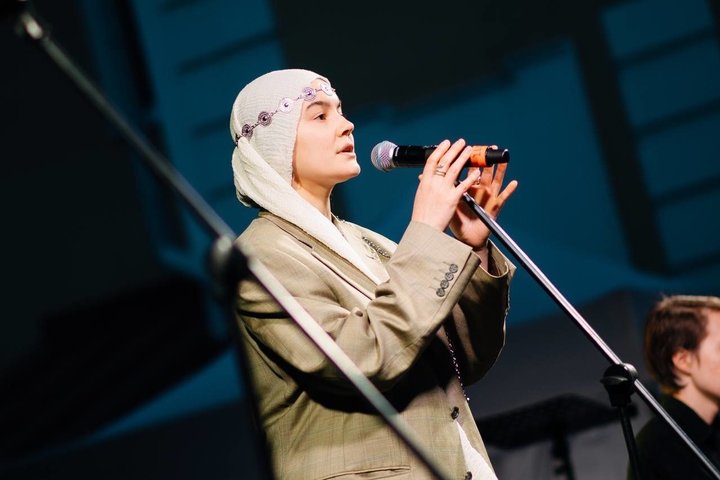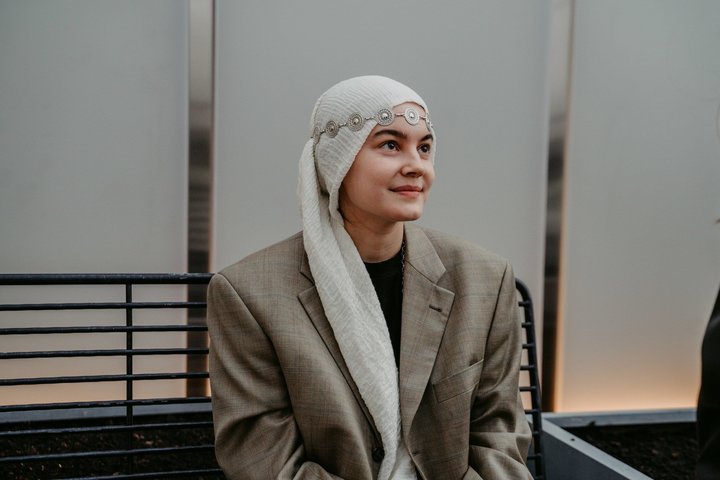lunami: ‘To believe, to hope and to thank’
The Kazan-Petersburg singer has only three songs online, but already tens of thousands of auditions

One of the promising debutantes from Tatarstan last year is the singer lunami, Amina Garayeva. The native of Kazan is now studying in St. Petersburg and visits the republic now with concerts. On July 21, lunami performs in Chuvashia at Shevle festival, and she is also going to release four singles in the near future.
“The people of St. Petersburg are my outlet”
What places, feelings, and memories in Kazan are important to you?
Kazan is directly associated with my school days — my 19th gymnasium, Pobedy Prospekt, how my friends and I went to MacDonald's near the subway after the school day. If I make a map of my life in Kazan, there will definitely be these points — Sele” on Ostrovsky Street, Dashka on Ershova Street, dancing on Bauman Street and in the old NCC, English on Karl Marx Street. It covers the entire native center, the hills at the foot of the Kremlin, the embankment, the Black Lake Park, Freedom Square. All places may be so worn out for tourists, but for me, there is a reflection of my youth.
I spent my childhood in Almetyevsk. What was this city like then and has it changed now?
Almetyevsk of my childhood is a kindergarten Progymnasium, the first art school, a huge vegetable garden in the backyard of the “Red Army” (surprisingly, now in St. Petersburg, my university is located on Krasnoarmeyskaya Street), the “living” Almetyevsk fortress from the hills around the city, overnight stays with the first best friend-namesake Aminushka. The city attracts with its simplicity, freedom, and naturalness. Now the native village of Maktama, Karabash, abi-babaylar connects with the city.
Why did you go to St. Petersburg?
I knew from a very young age that I wanted to study architecture and design, and in 2020, when it was time to choose a university, I was rushing between Kazan and St. Petersburg architectural universities. Moscow is not close to me in terms of the pace of life and architecture of the city. But Saint-Petersburg called with his free winds, the wide big water of the bay and the Neva and the vibe, the mentality of the inhabitants. Kazan still holds, beckons, and perhaps I will come back, in sha Allah, but now I am grateful to my heart for choosing St. Petersburg at the end of 2020.

How friendly is this city to you, do you feel different there?
Since the first year, I felt that we were on the same wavelength with the city. Sometimes, however, I feel “different” there — but only in a positive way. The people of St. Petersburg are my outlet. This is something that inspires and warmly embraces, reminding me of my hometown. Every time I return from Kazan back to study, it's like “going home from home”.
It always seemed to me that there is a rather difficult Tatar community there.
I would also like to note that about a year and a half ago, my Tatar friends Azalia and Kamila, out of a desire to be closer to our native culture and language, organised our Tatar speaking club in St. Petersburg — “Tatar tugerege”. A certain “little Tatarstan in greater St. Petersburg”. Now it has become wider, attracted a bright, young community of Tatars (and not only), which lives, thrives, realises, freely and naturally manifests its identity, which I am very, very glad about.
“Now I have three full-fledged Tatar songs”
When did you start writing songs?
The first poems appeared in the year 2018-2019, when I got enough of recording covers of songs by other artists, and a great desire arose in my soul to give, invent, draw my own.
Do you have many Tatar songs, how did they begin to appear? How did the most popular one, “Kil Yanima”, appear?
The first song in the Tatar language was written in 2020 — “Yuk dimak aye”. It is very simple, clumsy, funny, and it can even still be found in VK in the demo album “new moon”. The next song in Tatar was “Kil Yanima”. It was written, as usual, almost in one sitting, easily. It's amazing that if many of my songs are based on experiences or feelings, then “Kil Yanima” originally originated from an interesting sound and combination of words. And then, when I started thinking about the video for it, I found a deep “own” meaning. Now I have three full-fledged Tatar songs, plus three songs where Tatar and Russian are mixed. Some of them are still waiting for their release.
Who helps you arrange and record music?
The sound engineer of all my songs is Samat Gibadullin. He also wrote an arrangement for the noor band, in fact, I learned about his work from them.
“Every person has their own creative history”
How much concert experience do you have?
The concert experience is not so extensive at the moment, but this summer promises to be very eventful for going on stage. So far, in my collection, there are scenes of “Salat Bilyar Forum”, “Octaves” in Lyadsky garden and “Min tatarcha soylasham”. In the near future, it will be possible to listen to us in Chuvashia — on July 21 at the Shevle festival.
Do you think that there is a certain wave of “singing covered girls”? Do you communicate with the girls from noor?
Deux Noors are my inspirers and dear friends. And this is the first time I've heard about the wave. I think that every person, no matter whether male or female, covered or uncovered, has his own creative history, his own definite true intention behind any business, in particular musical. And what this intention is, is known only to God.
What are you proud of from the achievements in design?
I am proud and grateful for my courage to declare that I am a designer without having any education. It seems that the self-taught story works for me in any case. And here people's trust in me as a professional is very, very valuable.
What are you going to do next?
To believe, to hope and to thank. And then only to act, of course.